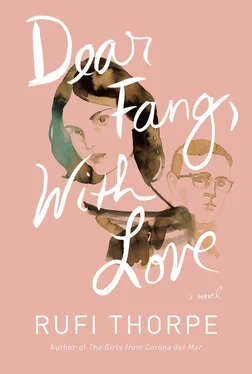“Well!” Darius said. “Are you ready to visit the Great Synagogue of Vilna?”
Everyone was excited and there was murmuring as we stood to go. Darius led us out onto the street where it was lightly raining, a relief from the heat. Umbrellas were popped open and Vera and I wound up borrowing one from the Owl People who had brought two and were generous enough to share. Our group was small that day. Judith hadn’t come because she was exhausted, she said, and didn’t want to be dragged through the rain, though probably it was just because she was high. Who wouldn’t want to stay inside, cozy, smoking pot and eating apples and farmer’s cheese? But I didn’t see Susan or Daniel in the group, either.
Darius himself marched through the streets without an umbrella, unstoppable, like an automaton who did not feel the rain. Vera and I followed, not talking to each other. It wasn’t that I was still mad about her smoking pot, I was over it, but she had something else going on, some kind of internal drama that I wasn’t invited to participate in. She carried herself like a dishonored queen. Even the way she held her head at an angle as she considered the buildings around us seemed watched and pretentious, and I thought about my mother saying there was something toxic about being very beautiful. It must be terrible to be a woman. I honestly thought that, looking at my daughter in the rain. I thought her life would have been better or easier if she had been born just a little bit uglier. When had she gotten so beautiful anyway? The weight she’d gained this past year seemed to have melted off again. There was no more bald spot at the back of her head, or else she had figured out a way to hide it by wearing her hair in a bun.
Darius stopped us in front of a playground. There was a building on the back half of the lot that appeared to be some kind of kindergarten: There were children’s paintings hung up in the windows.
“Here we are,” Darius said. “This is the Great Synagogue.”
We all looked at him, confused.
“It was partially destroyed by the Germans during World War II, but the entire complex was torn down by the Soviet authorities. They replaced it with this park and kindergarten so that no memorial could be erected.”
We all stood there, looking at the rain-soaked park with its swing set and mud puddles. Perhaps it would not have seemed so sad if there had been children playing, but there were none. It was impossible to imagine the Great Synagogue, though we had just spent forty minutes watching a slide show of images of it. It was impossible to imagine anything other than the playground in front of us, its puddles glimmering as the rain continued to fall. Vera whimpered, and when I looked over, I saw she was crying.
“Whoa,” I said softly and put an arm around her. I had experienced this temple-turned-kindergarten revelation as surreal and sad, but it was clearly hitting Vera much harder.
“Three pieces survived the destruction,” Darius went on. “And we will visit them at the Vilna Gaon Jewish State Museum tomorrow.” He described the pieces, but I was distracted. Vera could not seem to stop crying. It was no longer just tears silently slipping down cheeks, but audible, hiccupy sobbing.
“Are you okay?” I asked, which caused her to duck her face into her hands. She started hyperventilating.
“When they destroyed the Great Synagogue,” Darius was saying, “there was a rabbi who tried to save it, refusing to leave, so they took him out front and put a garden hose down his throat and turned it on until his stomach exploded inside him and he died.”
Vera was now crouched on the ground, her face completely hidden in her hands. I squatted beside her.
“What’s going on?” I asked. “Are you all right?”
She didn’t say anything.
I was trying to understand if we should attempt to continue with the group or just depart and give up on the rest of the tour.
Vera was struggling to breathe. “There’s so much violence,” she said, gasping. “It was a house of God. How could you look at it and tear it down?” She slapped her hands down in a puddle then cupped the rainwater in her hands and splashed her face so that her cheeks were wet and streaked with mud.
Vera poured more of the muddy rainwater over her head, wetting her hair. It came to me very quietly, the knowledge: that it was happening, that Vera was having another episode. It was like a whisper inside my mind, but I knew. I had never even truly thought it could happen while she was on so many meds. But now I knew it, and I was filled with the cold calm of emergency. Continuing on with the tour was no longer an option.
“Are you okay?” the Owl Woman mouthed to me.
I nodded. “We’re fine, just go on ahead,” I said, and motioned for her to rejoin the group that was slowly making its way down the street.
“Vera,” I said. “We’re going to go back to the house, all right?”
She nodded, biting her lip, holding her wet hands out in front of her, but she sat down on the curb. I crouched in front of her.
“God must be so disappointed in us,” Vera said, wiping her eyes. I didn’t know what to say to this. I didn’t entirely believe in God, not in that way. I didn’t believe in a being who had personal feelings like disappointment. On the other hand, I could empathize completely with the devastating emotional realization that this is what human beings were: the kinds of animals that built Great Synagogues, and the kinds of animals that shoved garden hoses down the throats of holy men and then watched as they died. I rubbed her shoulder in a way I hoped was soothing.
Maybe I was wrong about this being part of an episode. Maybe her reaction to the destruction of the Great Synagogue was because she was a Jew and I was not, or maybe because she was stoned, or else because she was seventeen and understanding the full cruelty of human history for the first time. But God, she had never looked more like Katya than at that moment.
“Your mother would get upset like this when she was your age,” I told her. “Only for her it was about American slavery.”
Vera looked up. “She did?”
“Yeah,” I said. “I remember she had a breakdown in the middle of American history class. They were watching Roots and she had to leave the room and go throw up in the bathroom. She said it was like it was happening to her, watching it. She said it was okay to experience the suffering of the slaves, because at least that was pure, but what made her throw up was feeling inside herself the cruelty of the masters.”
“That poor rabbi,” Vera said, starting to cry again.
I nodded, though I did not want to think about the rabbi, had built up ramparts in my mind against that kind of information long ago.
“I’m really hungry,” Vera said.
I took her wet, gritty hands in mine. “Then let’s get something to eat.”
—
We wound up in the Belgian restaurant that was the ground floor of our building, again. This time we both ordered the borscht. “I’m sorry I got so freaked out,” Vera said, tearing into one of the rolls in the basket and dipping it in the rich pink broth of her soup. She had gone into the bathroom of the restaurant when we first got there to clean the mud from her face, and her hair was still wet and slicked back from her forehead. It made her look vulnerable. “But then why should I be sorry — who can hear something like that and just stand there? You know, it’s sort of disgusting, all of us here on vacation.”
I nodded. It was swelteringly hot out, but it continued to rain. Our table was right by the window and I watched the drops coming down and hitting the steaming cobblestone street. “But it’s also about memory,” I said, thinking of Darius, of his peculiar unbending rigidity. “Remembering. There’s nothing gross about that — trying to hold on to the memories of your people. That’s important.”
Читать дальше












